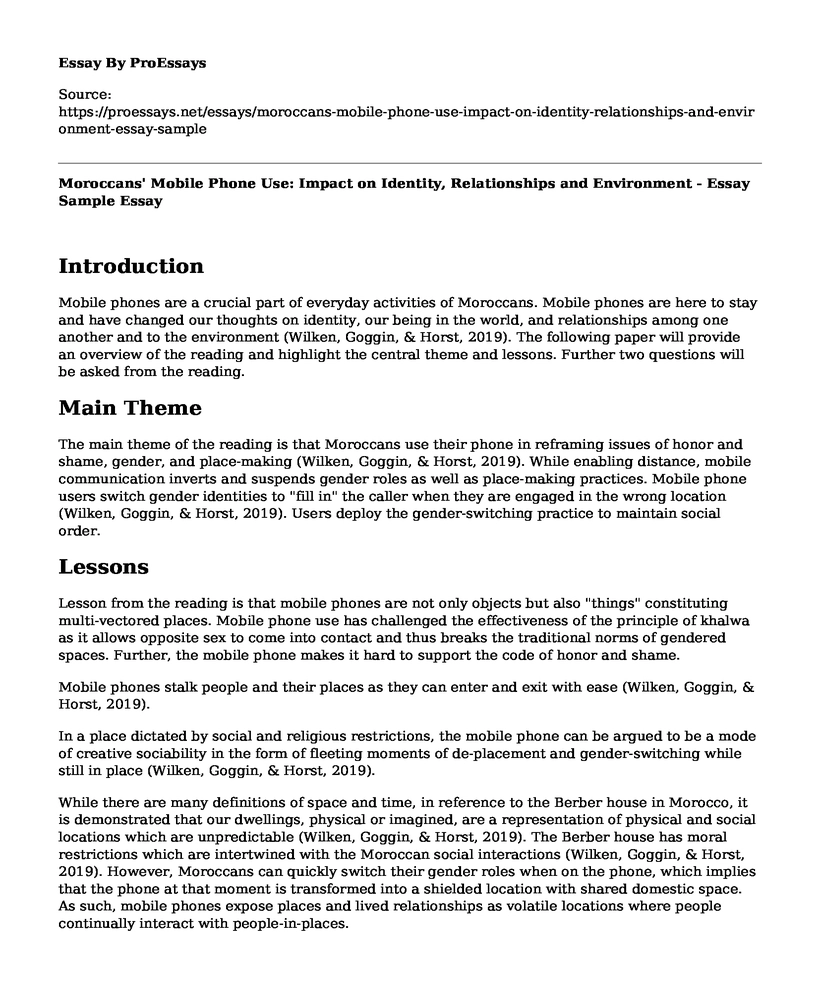Introduction
Mobile phones are a crucial part of everyday activities of Moroccans. Mobile phones are here to stay and have changed our thoughts on identity, our being in the world, and relationships among one another and to the environment (Wilken, Goggin, & Horst, 2019). The following paper will provide an overview of the reading and highlight the central theme and lessons. Further two questions will be asked from the reading.
Main Theme
The main theme of the reading is that Moroccans use their phone in reframing issues of honor and shame, gender, and place-making (Wilken, Goggin, & Horst, 2019). While enabling distance, mobile communication inverts and suspends gender roles as well as place-making practices. Mobile phone users switch gender identities to "fill in" the caller when they are engaged in the wrong location (Wilken, Goggin, & Horst, 2019). Users deploy the gender-switching practice to maintain social order.
Lessons
Lesson from the reading is that mobile phones are not only objects but also "things" constituting multi-vectored places. Mobile phone use has challenged the effectiveness of the principle of khalwa as it allows opposite sex to come into contact and thus breaks the traditional norms of gendered spaces. Further, the mobile phone makes it hard to support the code of honor and shame.
Mobile phones stalk people and their places as they can enter and exit with ease (Wilken, Goggin, & Horst, 2019).
In a place dictated by social and religious restrictions, the mobile phone can be argued to be a mode of creative sociability in the form of fleeting moments of de-placement and gender-switching while still in place (Wilken, Goggin, & Horst, 2019).
While there are many definitions of space and time, in reference to the Berber house in Morocco, it is demonstrated that our dwellings, physical or imagined, are a representation of physical and social locations which are unpredictable (Wilken, Goggin, & Horst, 2019). The Berber house has moral restrictions which are intertwined with the Moroccan social interactions (Wilken, Goggin, & Horst, 2019). However, Moroccans can quickly switch their gender roles when on the phone, which implies that the phone at that moment is transformed into a shielded location with shared domestic space. As such, mobile phones expose places and lived relationships as volatile locations where people continually interact with people-in-places.
Questions to Classmates
While it is argued that the loose morals and corrupting ways of the mobile phones are more significant than its advantages and that mobile phones make it hard to support the code of honor and shame, don't you think that there needs to be a better approach to defining moral standards in the society?
Since mobile phones stalk people and their places as they can enter and exit with ease and also facilitate gender-switching when users are in the wrong location in a society restricted by social morals, can we argue that the role of society in defining social code and honor is out of their control in this technology era?
References
Wilken, R., Goggin, G., & Horst, H. A. (Eds.). (2019). Location Technologies in International Context. Routledge.
Cite this page
Moroccans' Mobile Phone Use: Impact on Identity, Relationships and Environment - Essay Sample. (2023, Feb 13). Retrieved from https://proessays.net/essays/moroccans-mobile-phone-use-impact-on-identity-relationships-and-environment-essay-sample
If you are the original author of this essay and no longer wish to have it published on the ProEssays website, please click below to request its removal:
- Research Paper Sample on Organic Photovoltaic Devices - a Renewable Energy Source
- Innovations in the UAE Paper Example
- Western Science and Technology Essay Example
- Essay Sample on the Benefits of Nuclear Power Plants Outweigh the Potential Harmful Applications
- Essay Sample on Robots Replacing Humans: The Future of Work?
- Smartphones Revolutionize Communication: Older Generation Struggles to Adapt - Essay Sample
- Essay on Microsoft: Innovative Strategies for Software Progress & Consumer Satisfaction







